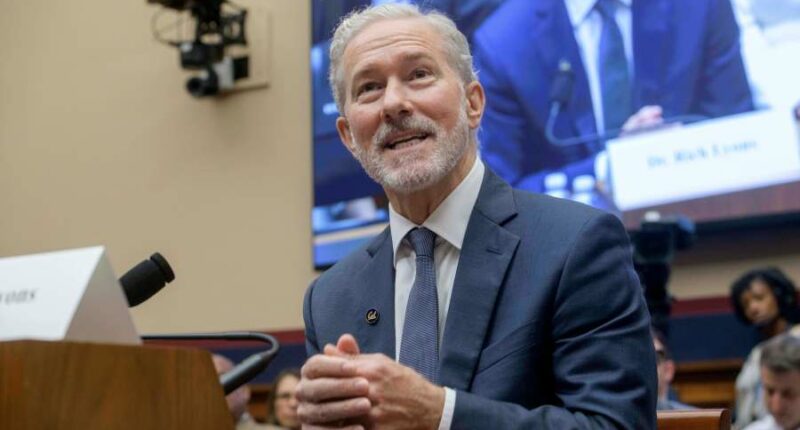Share this @internewscast.com

WASHINGTON (AP) — On Tuesday, House Republicans questioned leaders from Georgetown University, the City University of New York, and the University of California, Berkeley, during a new hearing focused on antisemitism in higher education. The lawmakers criticized these institutions for insufficiently addressing claims of bias or discrimination.
When testifying before the House Committee on Education and the Workforce, the leaders of the three universities indicated that disciplinary measures had been implemented when necessary and emphasized the significance of safeguarding free speech.
UC Berkeley Chancellor Rich Lyons pushed back on the suggestion that antisemitism was more present on college campuses than anywhere else.
“If somebody is expressing pro-Palestinian beliefs, that’s not necessarily antisemitic,” he said.
This hearing marks the ninth session organized by Republicans to examine university management regarding antisemitism allegations on campuses, which surged following the Oct. 7, 2023, Hamas attacks on Israel. Notably, critical testimony from 2023 by the University of Pennsylvania and Harvard University presidents led to their resignations.
At Tuesday’s hearing, Democrats blasted Republican committee members for their focus on antisemitism while not speaking out on the dismantling of the Education Department, which is tasked with investigating antisemitism and other civil rights violations in schools.
“They have turned this hearing room into a kangaroo court, where they spend our time litigating a predetermined outcome to do nothing, actually, to help Jewish students, just make public theater out of legitimate pain,” Rep. Mark Takano, D-CA.
Republicans said the university leaders have allowed campus antisemitism to run unchecked.
“Universities can choose to hire antisemitic faculty, welcome students with a history of antisemitism, accept certain foreign funding, and let the behavior of antisemitic unions go unchecked,” Michigan Rep. Tim Walberg, committee chair, said in his opening statements. “But we will see today they do so at their own risk.”
The hearing was periodically interrupted by protesters, who shouted pro-Palestinian slogans before being removed by Capitol police. Rep. Randy Fine, R-FL, berated the college presidents and said they were responsible because of the attitudes they had permitted on their campuses.
Republicans pressed the three college leaders on whether they had disciplined or fired faculty and employees for behavior they said was antisemitic. Rep. Elise Stefanik, R-N.Y., pressed CUNY Chancellor Félix Matos Rodríguez on the employment of a law professor who worked on the legal defense of Mahmoud Khalil, a Palestinian activist the Trump administration attempted to deport over his role in protests at Columbia University.
Stefanik pushed Matos Rodríguez to answer whether the professor should be fired. Without responding directly, Matos Rodríguez defended CUNY and said antisemitism had no place at the school. He said any student or employee who broke CUNY rules would be investigated.
University leaders also emphasized the importance of free speech on campuses for students and faculty.
Interim Georgetown President Richard Groves said that as a Jesuit university, fostering interfaith dialogue and understanding was a key part of the school’s mission. He said the university has not experienced any encampments or physical violence since the Hamas attack in October 2023.
“Given our Jesuit values, we expose students to different viewpoints on the Middle East,” Groves said. “In addition to speakers on Gaza, we’ve hosted IDF soldiers, families of Israeli and Palestinians who’ve lost their lives. U.S. families of U.S. hostages in Gaza. Georgetown is not perfect, and as events evolve, we’ve had to clarify rules of student behavior.”
___
The Associated Press’ education coverage receives financial support from multiple private foundations. AP is solely responsible for all content. Find AP’s standards for working with philanthropies, a list of supporters and funded coverage areas at AP.org.

















